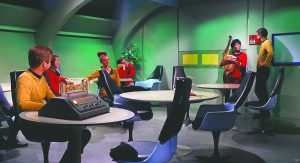
Star Trek isn’t as important for what it is, than for how the famous show set centuries in the future fit into an era of constant threat of nuclear annihilation, according to Games Institute Director Dr. Neil Randall during “A Moment in Time: Remembering the Night that Star Trek First Aired.”
Randall watched the Star Trek premiere on his family’s rabbit ear TV set in 1966. Having lived through the time leading up to the first episode, he shared the events and culture that went into the seminal sci-fi series with the audience on Sept. 29.
“Apparently, there’s some interest in hearing an old guy talk about that day,” mused Randall as he opened the talk.
The ‘60s were a time without cell phones or Internet. There were only a few networks and maybe half-a-dozen channels broadcasting to Randall’s childhood home. So where did Randall hear about Captain Kirk’s first adventure?
“[I] read about this Star Trek thing happening in the TV Guide, of course,” he said. As did many others. Without the high quantity of content we have today, cultural experiences were more common across the U.S. and Canada. “We knew Star Trek was coming, and there was a lot of hype.”
Star Trek wasn’t the first piece of sci-fi — that can be traced back as far as Frankenstein. But its naïve optimism made it stand out in a field of dystopian novels and short stories, and a world where children practiced for a nuclear apocalypse.
Randall remembered the tension and insecurity at the time. The Cold War, when the U.S. and the U.S.S.R. came close many times to launching nuclear attacks against each other, raged throughout the ‘60s. “We knew — and our parents and teachers kept telling us — it could all end soon.”
At the beginning of the decade, President John F. Kennedy declared that the U.S. would go to the moon within 10 years – and more importantly, before the U.S.S.R. It was crucial not just to history, but to sci-fi as well.
“Saying we’re going to land on the moon, and we’re going to do it in the next decade,” said Randall. “Imagine that speech happening today … this is not the kind of speech that happens today, to bring a nation together to do something [literally] outlandish.”
The dream of sending humanity into space inspired Star Trek and its kind, such as First Spaceship to Venus and First Men in the Moon. The creators of these shows didn’t want to simply give a vision of the future, but use sci-fi as a safe medium for talking about current events. Randall said that in Star Trek, “Gene Rodenberry [the show’s creator] tapped into the spirit of the ‘60s.”
But to Randall and others, the commentary wasn’t what drew him in. “The crucial thing was it didn’t refer to anything on Earth,” he said. “This was as much about leaving Earth as anything else. What’s out there, where’s humanity to go to not blow each other up.”
Star Trek was, like the dream of sending a man to the moon, an escape and vision for a better tomorrow.
“I couldn’t have cared less about the current matters … not of what the world was, but what it could be … not of what the world was, but as it should be,” said Randall.
“A Moment in Time” is part of the Games Institute’s Brown Bag Series. The Star Trek theme is inspired by Star Trek’s 50th anniversary. The Brown Bag Series is open for anyone in the UW community to attend. Check the Games Institute website for more information and upcoming talks.




























